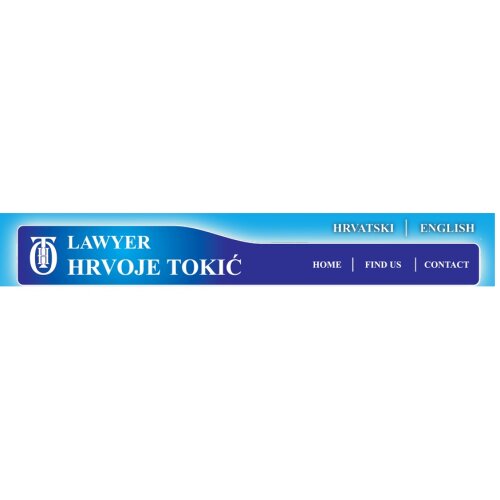Best International Lawyers in Dubrovnik
Share your needs with us, get contacted by law firms.
Free. Takes 2 min.
List of the best lawyers in Dubrovnik, Croatia
About International Law in Dubrovnik, Croatia
Dubrovnik, a historic Croatian city on the Adriatic Sea, serves as a key cultural and economic hub. As with any international location, Dubrovnik engages with international law by virtue of Croatia's involvement in treaties, trade agreements, environmental protocols, human rights issues, and more. This legal field encompasses disputes and cooperation involving foreign entities, international organizations, and multi-national corporations operating in or with Croatia.
Why You May Need a Lawyer
There are numerous situations where one may require legal assistance pertaining to international law in Dubrovnik:
- Resolving disputes related to international trade or business transactions.
- Navigating the complexities of cross-border employment laws.
- Handling matters related to international property ownership or real estate.
- Seeking asylum or dealing with other immigration issues.
- Working through family law matters that cross national borders, such as international adoptions or custody disputes.
- Addressing violations of international human rights frameworks.
Local Laws Overview
Understanding the intersection of local and international law in Dubrovnik is crucial for effective legal navigation:
- Business and Trade: Croatia is a member of the European Union, which means that EU regulations significantly influence trade-related laws. Compliance with both local and EU trade standards is mandatory.
- Immigration: Croatian immigration policies are subject to EU regulations and international treaties, which impact visas, work permits, and residency rules.
- Real Estate: Foreign nationals can purchase property in Croatia, but there are specific legal stipulations and taxes which must be adhered to.
- Human Rights: Croatia is a signatory to various international human rights treaties, making its adherence a key responsibility of both local and international bodies.
Frequently Asked Questions
1. Can foreigners freely invest in businesses in Dubrovnik?
Yes, but they must comply with certain regulations and may need to partner with local entities depending on the industry.
2. How can I resolve a cross-border dispute?
Engage an international lawyer familiar with both Croatian law and the relevant foreign jurisdiction to help mediate or litigate the issue.
3. Is English widely spoken in legal settings in Dubrovnik?
English is commonly used, especially in international legal contexts, but bringing a translator or hiring a bilingual lawyer may be beneficial.
4. What are the steps to follow for international adoptions?
Follow Croatia's international adoption procedures, ensuring compliance with both Croatian law and the law of the child’s home country, often requiring an international adoption lawyer.
5. Do different rules apply for EU and non-EU nationals?
Yes, EU nationals benefit from more streamlined processes under EU law, while non-EU nationals may face stricter requirements.
6. Can legal documents be apostilled in Croatia?
Yes, Croatia is a member of the Hague Apostille Convention, and documents can be authenticated with an apostille stamp.
7. How are business disputes typically settled?
Disputes may be settled through negotiation, arbitration, or litigation, with international arbitration being a common choice.
8. Are there restrictions on purchasing coastal property?
Yes, there are specific regulations about foreign ownership of coastal and agricultural land, and legal advice is recommended.
9. What kind of international human rights issues should I be aware of?
Stay informed on issues regarding discrimination, refugees, and equitable trade practices, relevant due to Croatia's international commitments.
10. Is there a mechanism for consumer protection in international trade?
Yes, Croatia follows EU consumer protection directives, providing mechanisms for resolving disputes concerning international trade matters.
Additional Resources
For more information and assistance, consider the following resources:
- Croatian Ministry of Foreign and European Affairs: For international treaties and agreements.
- The Croatian Bar Association: To find licensed lawyers specializing in international law.
- European Union Legal Framework: For EU regulations impacting international law.
- UNESCO World Heritage Centre: For specifics on cultural heritage laws affecting Dubrovnik.
Next Steps
If you require legal assistance in the realm of international law in Dubrovnik, take these steps:
- Identify Your Needs: Clearly define the area of international law you require assistance with, such as business, immigration, or human rights.
- Consult a Specialist: Seek a qualified international lawyer or legal consultant who specializes in your specific area of concern.
- Gather Documentation: Prepare any relevant documents that pertain to your legal issue for thorough consultation.
- Engage in Communication: Be transparent and communicative with your legal advisor to ensure all aspects of your issue are addressed.
- Follow Legal Procedures: Adhere to all legal advice and processes as guided by your lawyer to resolve your issue effectively.
Lawzana helps you find the best lawyers and law firms in Dubrovnik through a curated and pre-screened list of qualified legal professionals. Our platform offers rankings and detailed profiles of attorneys and law firms, allowing you to compare based on practice areas, including International, experience, and client feedback.
Each profile includes a description of the firm's areas of practice, client reviews, team members and partners, year of establishment, spoken languages, office locations, contact information, social media presence, and any published articles or resources. Most firms on our platform speak English and are experienced in both local and international legal matters.
Get a quote from top-rated law firms in Dubrovnik, Croatia — quickly, securely, and without unnecessary hassle.
Disclaimer:
The information provided on this page is for general informational purposes only and does not constitute legal advice. While we strive to ensure the accuracy and relevance of the content, legal information may change over time, and interpretations of the law can vary. You should always consult with a qualified legal professional for advice specific to your situation.
We disclaim all liability for actions taken or not taken based on the content of this page. If you believe any information is incorrect or outdated, please contact us, and we will review and update it where appropriate.








